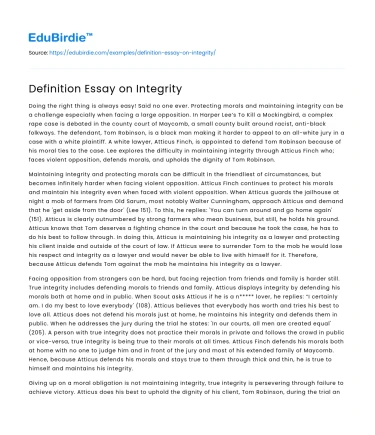Doing the right thing is always easy! Said no one ever. Protecting morals and maintaining integrity can be a challenge especially when facing a large opposition. In Harper Lee’s To Kill a Mockingbird, a complex rape case is debated in the county court of Maycomb, a small county built around racist, anti-black folkways. The defendant, Tom Robinson, is a black man making it harder to appeal to an all-white jury in a case with a white plaintiff. A white lawyer, Atticus Finch, is appointed to defend Tom Robinson because of his moral ties to the case. Lee explores the difficulty in maintaining integrity through Atticus Finch who; faces violent opposition, defends morals, and upholds the dignity of Tom Robinson.
Maintaining integrity and protecting morals can be difficult in the friendliest of circumstances, but becomes infinitely harder when facing violent opposition. Atticus Finch continues to protect his morals and maintain his integrity even when faced with violent opposition. When Atticus guards the jailhouse at night a mob of farmers from Old Sarum, most notably Walter Cunningham, approach Atticus and demand that he 'get aside from the door' (Lee 151). To this, he replies: 'You can turn around and go home again' (151). Atticus is clearly outnumbered by strong farmers who mean business, but still, he holds his ground. Atticus knows that Tom deserves a fighting chance in the court and because he took the case, he has to do his best to follow through. In doing this, Atticus is maintaining his integrity as a lawyer and protecting his client inside and outside of the court of law. If Atticus were to surrender Tom to the mob he would lose his respect and integrity as a lawyer and would never be able to live with himself for it. Therefore, because Atticus defends Tom against the mob he maintains his integrity as a lawyer.
Save your time!
We can take care of your essay
- Proper editing and formatting
- Free revision, title page, and bibliography
- Flexible prices and money-back guarantee
Facing opposition from strangers can be hard, but facing rejection from friends and family is harder still. True integrity includes defending morals to friends and family. Atticus displays integrity by defending his morals both at home and in public. When Scout asks Atticus if he is a n***** lover, he replies: “I certainly am. I do my best to love everybody' (108). Atticus believes that everybody has worth and tries his best to love all. Atticus does not defend his morals just at home, he maintains his integrity and defends them in public. When he addresses the jury during the trial he states: 'In our courts, all men are created equal' (205). A person with true integrity does not practice their morals in private and follows the crowd in public or vice-versa, true integrity is being true to their morals at all times. Atticus Finch defends his morals both at home with no one to judge him and in front of the jury and most of his extended family of Maycomb. Hence, because Atticus defends his morals and stays true to them through thick and thin, he is true to himself and maintains his integrity.
Giving up on a moral obligation is not maintaining integrity, true integrity is persevering through failure to achieve victory. Atticus does his best to uphold the dignity of his client, Tom Robinson, during the trial and after Tom is convicted. After the trial Scout recognizes that, 'Atticus had used every tool available to free men to save Tom Robinson' (241). During the trial, Atticus does everything he can to make an argument that Tom was incapable of and could not have raped Mayelle Ewell. In the months following the trial, Atticus continues to fight for Tom's freedom and gets a 'higher court [to review] his case' (219). Atticus continues to defend the dignity of Tom Robinson even after he loses. In conclusion, because Atticus did his moral and juridical duty before and continued to after he lost, he once again demonstrates integrity.
Atticus Finch demonstrates integrity throughout the novel when he faces a violent opposition, defends his morals with friends and family, and does his best to uphold the dignity of Tom Robinson. Each of the situations Lee puts Atticus in is designed to challenge his integrity. Integrity is having and upholding strong moral principles in which a person lives their life. Integrity is not like the tide that comes in and out, a person with integrity is solid as a rock and continues to live by their morals even when faced with opposition or defeat. Through thick and thin Atticus does not waver on his morals that all men are created equal and that Tom Robinson deserves a fair trial. From the start, Atticus knew he was licked, but he would do his best to protect Tom and uphold his morals even after defeat. What Atticus demonstrates is not easy, upholding morals and maintaining integrity can be hard especially when under pressure from peers. The best anyone can do is to be like Atticus and maintain integrity even when the world is against them.
Works Cited:
- Lee, Harper. To Kill A Mockingbird. Warner Books Edition, Warner Books, 1982.






 Stuck on your essay?
Stuck on your essay?

